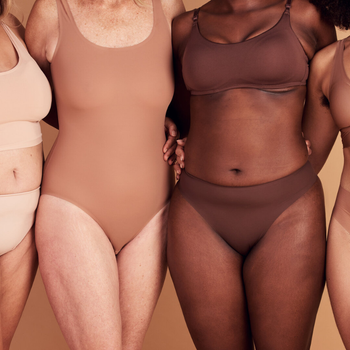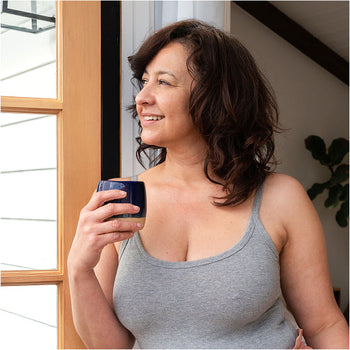We know that representation matters. In this Couch Conversation, we discussed how we can take a step forward towards better representation of menopausal women in media. By reflecting the experiences of women in media we’re working towards advancing women’s health education and destigmatizing the menopause so that less women feel alone during this time in their lives. At this discussion, held in Gloria Steinem’s home, we brought together voices from writer’s rooms to rally them in support of women’s health and the menopausal journey.
Menopausal women are in the prime times of their lives, contributing to society at the highest levels, but in films and on television, you wouldn’t necessarily know it. Aging women are erased from on screen visibility: just 1 in 4 characters who are 50+ are women.
We were fortunate to return to Gloria Steinem’s home and discuss destigmatizing menopause and raising awareness in the writer’s room. The conversation was hosted by CNN political commentator Karen Finney.
Our guests sat on the comfortable sofa in Gloria Steinem’s living room, a large black and white photograph of a child and an elephant kneeling, facing each other, hangs over them. Assorted chairs are pulled up to form a circle and accommodate the group of just over a dozen women. They work in a wide range of media outlets including comedy (which made for some nice belly laughs along the way), magazines, newspapers, books, television shows, and movies. Even our resident health expert, Dr. Suzanne Gilberg-Lenz, got to wear her writer’s hat. She shared with everyone that she has a book about the menopausal journey that is soon to be published. (read more about her upcoming book The Menopause Bootcamp here).
We were welcomed by Gloria, “Thank you for extending my dream. This is going to be called The Talking Circle House, I hope they’ll let me put a plaque outside.”
This conversation offered a different perspective than what we have experienced in the past. Our guests were intergenerational, yet we heard a lot of the same sentiments. “In a lot of our previous groups there are women who are clearly within the menopausal cohort,” said Kindra CEO Catherine Balsam-Schwaber. “There are younger faces in this room because the conversation can’t start then. It has to start before.”
“I really don’t know that much about it (menopause),” said Maria Randazzo, writer on The Problem with Jon Stewart. “I have three older sisters and I’m excited to learn more about what they’re going through.” This is part of the important work of Couch Conversations, starting a support system for women so that no one has to feel alone through menopause.
Reaching beyond women who are on their menopausal journey opened up a new angle for this Couch Conversation, confirming that no two meetings will ever cover the same ground. There was support for a new mother of a nine month old, remicincing over pandemic dynamics in the household, and a big question, the big question, was finally asked by one of the younger attendees: “What is menopause?”
“You are confused for a very good reason no one ever told you - this is a great day. It’s the day you learned about menopause” Dr. Suzanne Gilberg-Lenz said in response.
Here’s a good place to start for Menopause 101, but Catherine summed up what menopause is and why it’s important succinctly: “Technically, menopause is a one day event, it’s the day you didn’t get your period for a year, but the lack of innovation and investment in this moment of a woman’s healthcare spectrum has long-term reprecussions for the way we age.”
“It’s (menopause) such a relief. Think of all the time you’ve spent trying not to get pregnant and then to get pregnant. You’re free at last,” said Gloria.
But with that freedom comes a long list of symptoms, the perimenopausal and menopausal women in the group discussed the changes in the their body. Many in the room discussed struggles within the modern medical system, another voice chimed in, “I have a group chat where we say - Is it Covid or is it perimenopause?”
Karen Finney opened up about her own medical journey. Just last year she had a tumor removed that was pressing on her brain stem. She shared with the room the symptoms she was experiencing sounded like they could have been menopausal symptoms; even further complicating both diagnoses. “Doctors don’t always have the answers, for women 40 and up you’re kind of on your own,” she said.
It’s vital that we start to educate people about menopause and start a support system. “My only frame of reference for menopause is Samantha sweating her head off,” said Caroline Waxler, a comedy writer who has worked with the inimitable Joan Rivers.
“The modern medical system just isn’t doing the job,” said Catherine, “we need to look outside of the system for a movement to start that changes the way that menopause exists in our culture.” Media is one actionable way to connect people with education that can change lives.
The culture around menopause and women’s health needs to change. Kathy Najimy, actress and activist, shared how she has reframed the conversations around menstruation in her own house. “A period is full of dread and remorse – those are all things the patriarchy told us. Same thing with menopause. I feel like we’re at the point where we can collectively lift that.” The same logic can be applied to menopause, “It’s awesome - you’re still alive! It’s a blessing to have your period and a blessing to have menopause. It means you’re old enough to go through it.”
Earlier in the conversation, when many of the women in the room were telling Gloria about how inspiring they found her essay If Men Could Menstruate, she mused over what would happen if men went through menopause, “There would be a National Institute of Hot Flashes and paid leave every month. It’s not the thing itself but to whom it happens and the power level.” This got a big laugh from the room, full of many women who are experts in making people laugh.
Did You Know?
-
Women over 50 make up 20% of the population yet share just 8% of on-screen time. -Nielsen Study
-
Women average 2 hours 34 minutes of watching TV per day
-
Ten percent of movies last year included male characters 60 and older; only 6% included female characters 60 and older.
Which Brings Us To Women In Menopause…
-
53.5% of Americans aged 50-plus are women.
-
1B women will be post-menopausal by 2025. We want to hear and see their stories.
Feeling Inspired? Take Action
Get involved to make a difference, to lend support, to educate, to inspire. Get involved to empower people who experience the hormonal changes of menopause to care for their bodies—naturally, safely, and holistically. Whatever your reason for getting involved with Couch Conversations, you can keep the conversation going. Email couchconcierge@ourkindra.com to receive an easy, informative guide on how to host a Couch Conversation and inspire change within your own circle.













